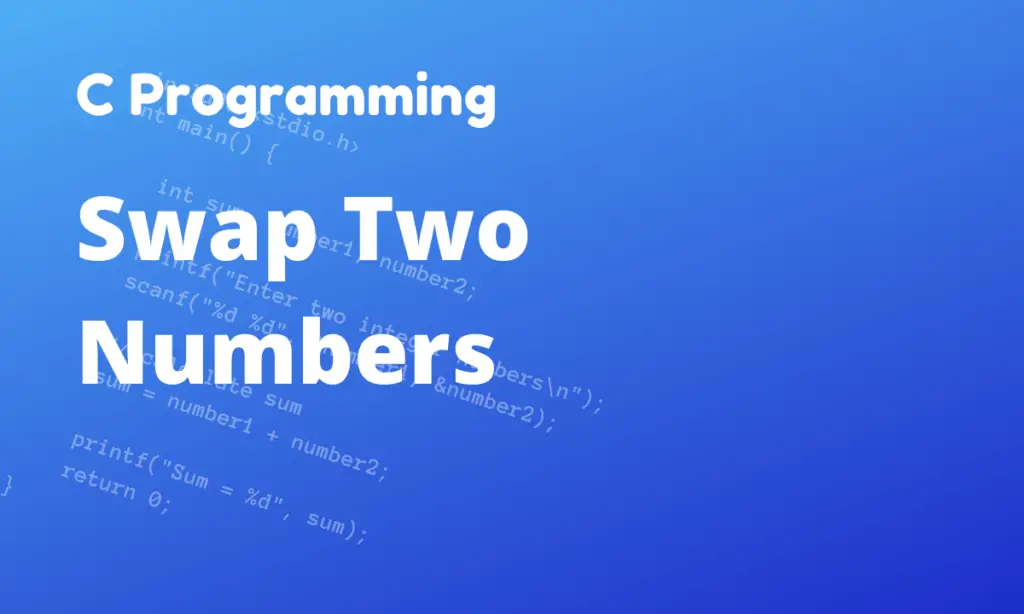In this example, you will learn how to swap two numbers with two different methods.
Contents
Method 1: Swap Two Numbers using Temporary variable
Method 2: Swap Two Numbers without using Temporary variable
C Program to Swap Two Numbers using temporary variable
#include <stdio.h>
int main()
{
int a, b, temp;
printf("Enter A value \n");
scanf("%d",&a);
printf("Enter B value \n");
scanf("%d",&b);
printf("Value of A : %d\n",a);
printf("Value of B : %d\n",b);
//swap logic
temp=a;
a=b;
b=temp;
printf("Value of A after swap: %d\n",a);
printf("Value of B after swap: %d\n",b);
return 0;
}Output
Enter A value 10
Enter B value 20
Value of A : 10
Value of B : 20
Value of A after swap: 20
Value of B after swap: 10Explanation
This C program asks the user to enter two integer values a and b, reads them using scanf(), and then swaps the values of a and b using a temporary variable temp. The program then displays the values of a and b before and after the swap using printf().
The program first declares three integer variables a, b, and temp. It then prints a message to the console asking the user to enter the value of a using printf(). The scanf() function is used to read the value of a entered by the user, and the address of a is passed as the second argument to scanf() using the & operator to ensure that the value entered by the user is stored in the memory location reserved for the a variable.
Similarly, the program prompts the user to enter the value of b using printf(), and reads it using scanf() with the address of b passed as the second argument.
Next, the program displays the values of a and b before the swap using printf(). Then, it performs the swap by storing the value of a in temp, assigning the value of b to a, and finally assigning the value of temp to b.
Finally, the program displays the values of a and b after the swap using printf(), and returns 0 to indicate successful completion of the main() function.
C Program to Swap two numbers without using Temporary variable
#include <stdio.h>
int main() {
int a, b;
printf("Enter A: \n");
scanf("%d", &a);
printf("Enter B: \n");
scanf("%d", &b);
// swapping logic
// a = (a - b)
a = a - b;
// b = (a - b) + b = a (initial)
b = a + b;
// a = a - (a - b) = b (initial)
a = b - a;
printf("Value of A after swap: %d\n", a);
printf("Value of B after swap: %d\n", b);
return 0;
}
Output:
Enter A: 10
Enter B: 29
Value of A after swap: 29
Value of B after swap: 10Explanation
This C program prompts the user to enter two integer values a and b, reads them using scanf(), swaps their values without using a temporary variable, and then displays the swapped values of a and b using printf().
After declaring a and b as integer variables, the program asks the user to input the values of a and b using printf() and scanf(), respectively.
Next, the program performs the swap operation without using a temporary variable. It subtracts b from a and assigns the result to a, which effectively stores the difference between the two variables in a. Then, it adds b to the new value of a and assigns the result to b, which effectively stores the original value of a in b. Finally, it subtracts the new value of a from b and assigns the result to a, which effectively stores the original value of b in a. At this point, the values of a and b have been swapped.
Lastly, the program displays the values of a and b after the swap using printf(), and returns 0 to indicate successful completion of the main() function.
Overall, this program demonstrates a way to swap two variables without using a temporary variable in C programming language.
Follow us on Facebook, YouTube, Instagram, and Twitter for more exciting content and the latest updates.
